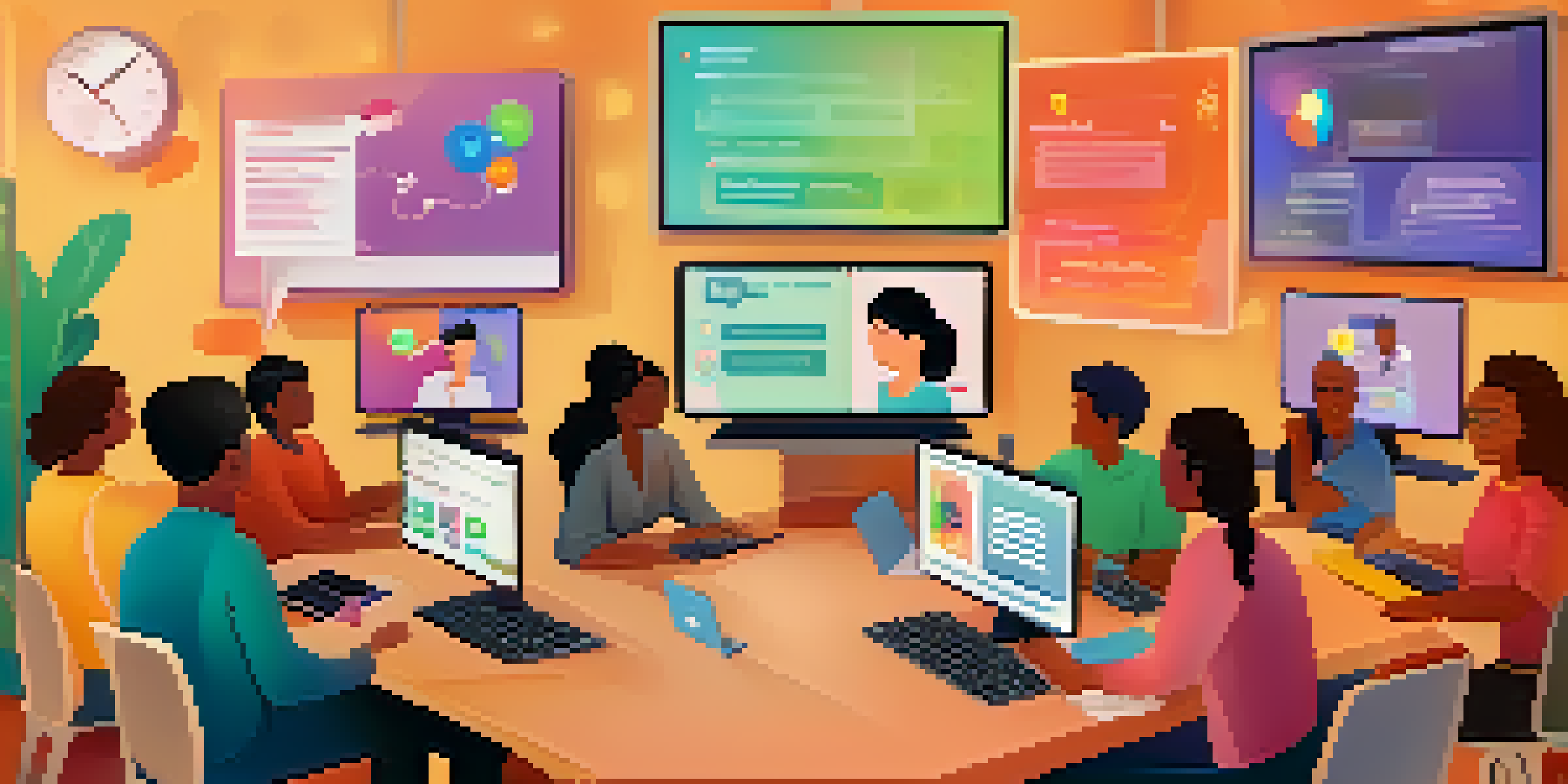The Role of Facilitators in Online Learning Communities

Understanding the Role of Facilitators in Learning
Facilitators are the guiding lights in online learning communities, helping to create an engaging and supportive environment. They are responsible for bridging gaps between learners and content, ensuring that everyone feels included and valued. By fostering communication, they help transform a static online space into a vibrant community where knowledge can flow freely.
The role of a facilitator is to help others learn rather than to teach them.
Imagine a classroom where the teacher not only delivers lectures but also encourages discussions, prompts questions, and ensures every student has a voice. This is precisely what facilitators do in online settings, adapting their strategies to suit diverse learner needs. They recognize that each participant brings unique perspectives and experiences, which enrich the overall learning experience.
Facilitators also play a crucial role in setting the tone for interactions, helping to establish norms and expectations that promote respect and collaboration. Their efforts in cultivating a sense of belonging can lead to higher engagement levels, ultimately enhancing the educational outcomes for all participants.
Building Community Through Effective Facilitation
A strong sense of community is vital for online learning, and facilitators are key to building this bond among participants. They employ various techniques, such as icebreakers and collaborative activities, to encourage connections among learners. This community aspect can make the online experience feel less isolating and more like a shared journey.

When facilitators actively engage with learners, they help forge relationships that can lead to deeper discussions and richer insights. Think of them as the glue that holds the community together, ensuring that everyone feels welcomed and heard. By creating opportunities for interaction, facilitators help participants feel more invested in their learning.
Facilitators Create Engaging Communities
Facilitators help build a strong sense of community among learners, fostering connections and encouraging active participation.
Furthermore, a supportive community nurtured by effective facilitators can lead to increased motivation and accountability. Learners are more likely to participate actively when they know they are part of a collective effort, fostering a positive cycle of engagement and achievement.
Encouraging Collaboration Among Learners
Facilitators play a pivotal role in promoting collaborative learning, which is essential in online environments. They design activities that encourage participants to work together, share ideas, and learn from one another. This collaborative spirit not only enhances understanding but also helps build valuable teamwork skills.
Great facilitators don’t just teach; they create an environment where learning can happen.
For instance, facilitators might create small group discussions where learners can brainstorm solutions to a problem. By guiding these discussions, they ensure that all voices are heard, leading to more comprehensive insights. This collaborative approach helps participants see the value in diverse perspectives, which can enrich their learning experiences.
Moreover, facilitators can introduce peer feedback mechanisms, allowing learners to critique and support one another's work. This not only builds confidence but also fosters a culture of continuous improvement, where everyone is encouraged to grow and learn together.
Providing Support and Guidance to Learners
One of the primary responsibilities of facilitators is to provide ongoing support to learners throughout their journey. They serve as mentors, offering guidance on course content, resources, and strategies for success. This support is crucial for learners who may feel overwhelmed or disconnected in an online environment.
Facilitators often check in with participants, addressing any concerns and providing personalized feedback. This proactive approach not only helps learners stay on track but also reassures them that they are not navigating the learning process alone. Just like a coach who encourages athletes to push their limits, facilitators inspire learners to reach their full potential.
Collaboration Enhances Learning Outcomes
Through collaborative activities and peer feedback, facilitators promote teamwork and deeper understanding among participants.
Additionally, facilitators can create a resource hub where learners can access supplementary materials or ask questions. This ensures that participants have the tools they need to succeed, reinforcing the idea that their learning journey is a collaborative effort.
Fostering Engagement in Online Learning Spaces
Engagement is the lifeblood of online learning, and facilitators are crucial in nurturing it. They employ various strategies to keep learners motivated and involved, from interactive discussions to multimedia resources. By making learning enjoyable and relevant, facilitators can spark curiosity and enthusiasm among participants.
For example, facilitators might use polls or quizzes to break up the monotony of standard lectures, making the learning experience more dynamic. They also encourage participants to share their experiences, which can lead to lively exchanges and deeper connections with the material. This emphasis on engagement ensures that learners remain active participants rather than passive recipients of information.
Moreover, facilitators can leverage technology to create immersive learning experiences, such as virtual simulations or collaborative projects. These innovative approaches not only enhance engagement but also provide learners with practical, real-world applications of their knowledge.
Assessing and Adapting to Learner Needs
Effective facilitators continuously assess the needs of their learners to adapt their approaches accordingly. They gather feedback through surveys, discussions, or informal check-ins, allowing them to understand how participants are experiencing the course. This adaptability is crucial for maintaining engagement and ensuring that learning objectives are met.
For instance, if a facilitator notices that learners are struggling with a particular topic, they may choose to spend additional time on it or provide extra resources. This responsiveness not only helps learners grasp challenging concepts but also demonstrates that their success is a top priority. It's akin to a gardener adjusting care based on the specific needs of each plant.
Support and Adaptation are Key
Effective facilitators provide ongoing support and adapt their approaches based on learner needs, ensuring everyone can succeed.
Additionally, facilitators can foster a culture of reflection, encouraging learners to assess their own progress and set goals. This practice empowers participants to take ownership of their learning journey, leading to greater satisfaction and success.
The Impact of Facilitators on Learning Outcomes
The influence of facilitators extends beyond immediate engagement; they significantly impact overall learning outcomes. Research shows that effective facilitation can lead to higher retention rates, improved understanding, and greater learner satisfaction. By fostering a positive and interactive environment, facilitators help students achieve their educational goals.
Consider the difference between a course led by a passive instructor versus one with an engaged facilitator. The latter not only enhances the learning experience but also encourages critical thinking and problem-solving skills. This active involvement can lead to deeper comprehension and application of knowledge, essential for success in any field.

Ultimately, the role of facilitators in online learning communities cannot be overstated. Their ability to create supportive, engaging, and adaptive learning environments plays a crucial role in shaping the future of education, ensuring that learners are equipped to thrive in an ever-changing world.